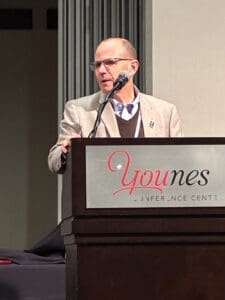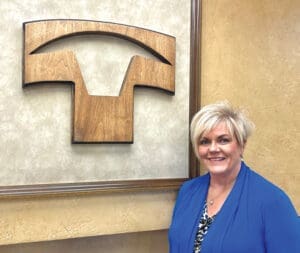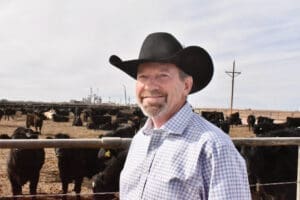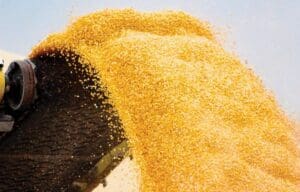By Blaine Davis, Contributing Editor
Heading south, and just 35 miles into my wife’s and my fall vacation to the Gulf Coast, we encountered a life-altering experience. A northbound semi-truck lost a wheel and tire from its trailer’s axle, striking my “iron steed” head-on. Lucky to be alive, our vehicle was a total loss, with just my “EAT BEEF” front license plate surviving, but battered much like the industry it represents. Not to be daunted, the wrecker service returned our vehicle to our residence to reload all of the vacation paraphernalia into my wife’s SUV, and the Gulf Coast trek was back on, just a few hours late.
Experiencing what still seems surreal, our vacation was rewarding with a couple days spent on the beach at the 2021 Texas Sandfest, combined with a few days of small projects transforming our beach house into our home. With the battered license plate in hand, I kept having recurring thoughts of the split-second incident and, again, those never-ending attacks on the beef industry.
As per Hannah Thompson-Weeman’s column in Drovers magazine this past August, animal rights activists hammer the industry much like the appearance of my vehicle. They spout rhetoric bordering on inane with, “[Fish] are not just alive. They have lives. They’re not just biology. They have biographies.” and “I’m not interested in people’s feelings. I’m not interested in people all that much. I want one thing: to create a world where animals live their own lives according to their own will.”
The utmost epitome of their misdirected and misinformed zeal is exhibited with, “Every morsel of meat we eat is slapping the tear-stained face of a hungry child” and “When you buy from animal agriculture, you’re supporting environmental racism.”
While much of this rhetoric can be dismissed as fools’ speak, in the past year, Greg Henderson of Drovers reported the Intergovernmental Platform on Biodiversity and Ecosystem Services’ (IPBES) report makes the standard claim cows are bad for the environment, but with a new twist – cows will also make future pandemics worse. Peter Daszak, a zoologist who released the study to journalists in Rome, said “Over-consumption of meat … [is] bad for our health. It’s unsustainable in terms of environmental impact. It’s also a driver of pandemic risk.”
The study professes that pandemics will emerge more often, spread faster, cost more and kill more people than COVID-19 without action to halt habitat destruction that aids viruses to hop from wildlife to humans. Their solution is more governmental inference in the form of a tax on livestock production and meat consumption.
On our home soil, Sen. Cory Booker (D-N.J.) introduced the Farm System Reform Act (FSRA) as reported again by Greg Henderson in Drovers this past July. Booker tells it would, “create a level playing field for independent family farmers” and “transform the broken system built by multi-national meatpacking companies.”
With endorsements from more than 90 non-governmental agencies (NGAs) ranging from Mercy for Animals, Farm Sanctuary and Earth Justice to the Union Theological Seminary in the City of New York and even The Alliance of Baptists, the nuts and bolts of this are all but questionable. First, it would place a moratorium on large, concentrated animal feeding operations (CAFOs) and, second, authorize $100 billion over 10 years to buy out CAFOs and cover transition costs of alternative agriculture activities such as raising pasture-based livestock. Booker sets a size limit of 1,000 head for operations that exist beyond 2040.
Having a senator far removed from America’s agricultural heartland proposing such legislation without any research, as in what impact could be expected on our food system and the economic effects on farmers in our heartland, he might as well be from Mars. FSRA would be a disaster for livestock producers, consumers and taxpayers with another governmental buy out. Producing beef would take a least twice as long with multiple times the resources and inputs. Retail prices would skyrocket as supplies dwindle, but what would the senator care? He is a vegan.
With the salvos of uneducated, misinformed and just plain bias battering animal agriculture, the industry’s’ work is never done. It is time for agriculture to set the record straight and make sure their voices are heard. In response to the “honorable” Sen. Booker, Ethan Lane, National Cattlemen’s Beef Association (NCBA) vice president of governmental affairs, said, “Ninety-five percent of cattle raised in the United States visit a feedyard. Feeding operations aren’t antithetical to small, family-owned farms and ranches – they’re part and parcel of the same symbiotic supply chain that produces the most nutritious, sustainable beef in the world.”
In support of its sustainability, beef production today is that of the mid-1970s with one-third fewer cattle. Beef cattle also play a key role in what scientists call up-cycling – turning grass, corn stalks and byproducts into to high-quality protein for human consumption. Research suggests that cattle produce 19 percent more edible protein than they consume.
The continued battering of animal agriculture by the extremists appears to have just one goal – elimination of livestock. As per my climate “hero,” Professor Frank Mitloehner of the University of California-Davis and respected air quality expert, “Producing less meat and milk will only mean more hunger in poor countries. Smarter animal farming, not less farming, will equal less heat. As production per cow becomes more efficient, the environmental footprint is reduced.”
Evidenced by the numbers provided by the United Nations, globally, cattle are responsible for roughly 14.5 percent of greenhouse emissions. Contrarily, American beef production is only responsible for 3 percent of the greenhouse gas emissions due to the efficiencies gained since the 1970s.
Each day, the opposition of do-gooders, ranging from animal rights zealots and climate theorists to the truth deniers and far-left politicians, batter American agriculture. To respond to these attacks, I am reminded of the lyrics to the Front Porch Song written by Lyle Lovett and Robert Earl Keen while students at Texas A&M University:
This old porch is just a big ol’ red and white Hereford bull
Standing under a mesquite tree in Agua Dolce
He just keeps on playing hide and seek with that hot
August sun
He sweatin’ and a-pantin’
Cause’ his work is never done
Aw, no
I’ve known a whole lot of old bulls in my life
And their work is never done.
Akin to Lovett and Keen’s red and white Hereford bull, American agriculture’s work is never done.





